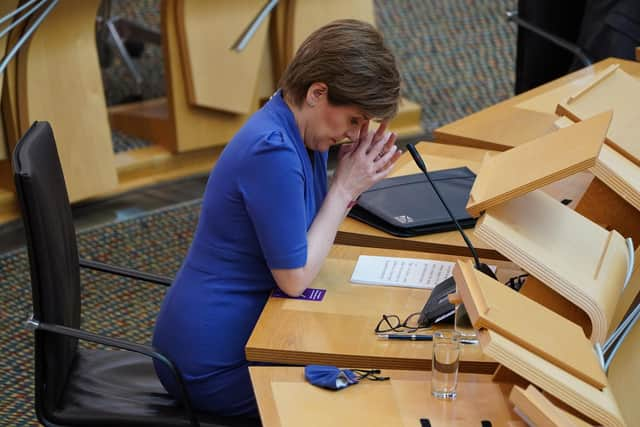Scottish independence: Majority of Scots think 'de facto' referendum is 'wrong', poll shows, as SNP voters struggle to name Nicola Sturgeon's successor
This article contains affiliate links. We may earn a small commission on items purchased through this article, but that does not affect our editorial judgement.
Fewer than one in three Scots back Nicola Sturgeon’s plans to fight the next general election as a ‘de facto’ referendum should the Scottish Government lose its court case around its referendum Bill.
The poll also suggests SNP members are at a loss as to who they think should eventually replace the First Minister as leader of their party, with almost half being unable to name a potential successor.
Advertisement
Hide AdAdvertisement
Hide AdThe poll, undertaken by Savanta ComRes for The Scotsman, interviewed 1,029 Scottish adults aged 16 and over between September 30 and October 4.
The numbers around the ‘de facto’ referendum will come as a significant blow to the First Minister.
They are being published on the same day as ‘Independence Day’ at the SNP party conference in Aberdeen, with speeches from constitution secretary Angus Robertson and SNP president and political director of the party’s independence unit, Michael Russell.
Ministers are widely expected to lose the case at the Supreme Court, with hearings starting on Tuesday, around whether the Scottish Parliament can legislate for a referendum without the consent of the UK Government.


Ms Sturgeon has said if they do lose, the SNP and the Scottish Greens will fight the next election as a ‘de facto referendum’.
Just a third (32 per cent) of Scots believe fighting the next general election as a ‘de-facto’ referendum on independence is the right thing to do, with more than half (55 per cent) stating such a campaign would be the wrong thing to do.
SNP voters are also split on the issue, but are overall more supportive of the plans than the general public.
Around three in five (59 per cent) SNP voters in the Holyrood elections back the strategy, but a significant minority – 25 per cent – believe it is the wrong move.
Advertisement
Hide AdAdvertisement
Hide AdThose planning to vote Yes are similarly split on the issue, but are in general slightly more supportive, with 64 per cent backing the strategy and 23 per cent opposing it.
Only half (53 per cent) of Yes voters in 2014, however, back the move.
Scottish Conservative voters are the most likely, alongside those backing the Scottish Liberal Democrats, to oppose the move, with 89 and 86 per cent of their 2021 voters stating it is the wrong thing to do.
One in seven (14 per cent) Scottish Labour voters at the Holyrood elections, rising to almost one in five (18 per cent) when looking at Labour 2019 general election voters, back the move, with around three quarters opposing it.
Fighting the general election in this manner does not seem to impact the likelihood of people voting for the SNP or shifting to opposition parties.
One in five voters (21 per cent) said it would make them more likely to vote SNP, while 22 per cent said it would make them less likely to do so, including 5 per cent of SNP voters.
Some in Holyrood believe the move towards a ‘de facto’ referendum will also be used by Ms Sturgeon as her route out of Parliament and the top job if the SNP fall short of their 50 per cent of the vote target.
However, SNP voters have no strong favourite for who should take over from the longest serving First Minister, with half (47 per cent) of those surveyed unable to name a potential successor, suggesting the race is wide open.
Advertisement
Hide AdAdvertisement
Hide AdWestminster leader of the SNP, Ian Blackford, received the highest backing from SNP voters, with 10 per cent saying they would like to see him as the party’s next leader, followed by finance secretary Kate Forbes on 9 per cent.
Deputy First Minister John Swinney along with former Westminster leader and now constitution secretary, Mr Robertson, finished joint third with the backing of 7 per cent of SNP voters.
Joanna Cherry, one of Ms Sturgeon’s fiercest internal critics, is fourth on 6 per cent, followed by health secretary Humza Yousaf on 4 per cent.
Mairi Gougeon, the rural economy secretary, was the only other option to poll above a single percentage point, gaining the backing of 3 per cent of SNP voters.
Keith Brown, the SNP deputy leader, Neil Gray, junior culture minister and a name many tip for the top job, education secretary Shirley-Anne Somerville, and social justice secretary Shona Robison all polled just 1 per cent.
A fake potential successor, Martyn McNally, included in the survey received less than 1 per cent backing.
All episodes of the brand new limited series podcast, How to be an independent country: Scotland’s Choices, are out now.
It is available wherever you get your podcasts, including Apple Podcasts and Spotify.
Comments
Want to join the conversation? Please or to comment on this article.

